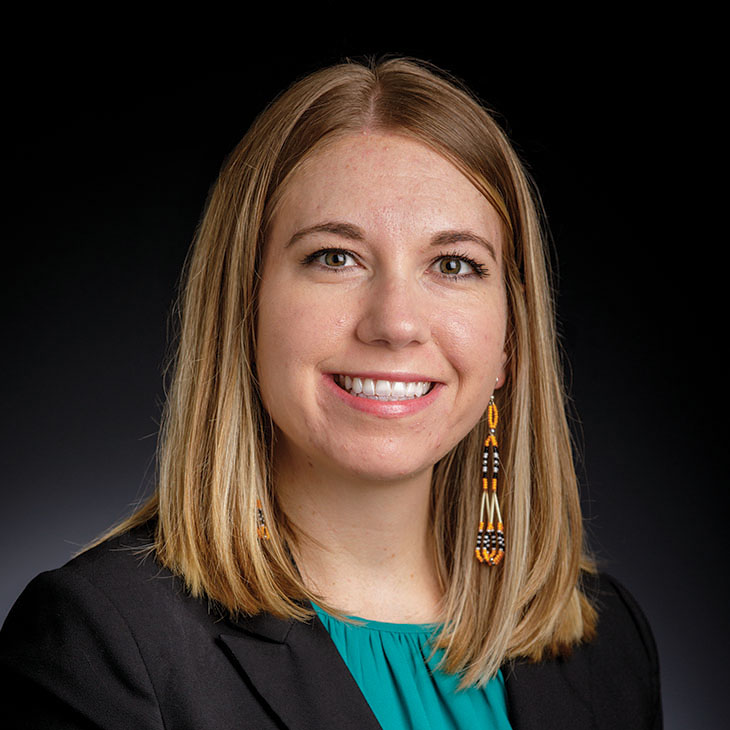
OSU psychology professor studying perception of Native communities
Friday, October 21, 2022
Media Contact: Harrison Hill | Senior Research Communications Specialist | 405-744-5827 | harrison.c.hill@okstate.edu
When studying health trends in a community, it’s easy to focus on the bad things and areas that need improvement.
While fixing those problem areas does work, Dr. Ashley Cole, an assistant professor in the Oklahoma State University Department of Psychology, is hoping to change how we look at health inequities and how research can lead to more effective help.
An enrolled member of the Citizen Potawatomi Nation of Oklahoma and an OSU alumna, Cole has a unique connection to her research.
“I have some personal interest in helping Native American communities address health disparities and health inequities,” Cole said. “I love Oklahoma. I’m very biased, clearly.”
Cole has always been interested in trying to use her training and skill set to help address some of those health inequities, she said.
“Just being Native myself, being from Oklahoma, I’ve always had this desire to try to help our communities,” Cole said. “If you look at some of the national statistics, like from the CDC or from the World Health Organization, you see at first glance a lot of risks, you see a lot of pathology in Native communities, higher rates of substance use disorder, higher rates of smoking, higher rates of cancer, higher rates of suicide.”
However, these issues are not the only things that need to be highlighted, Cole said.
“One thing I’ve really learned more and more as I do this work is we do our communities a disservice by focusing only on what’s going wrong,” Cole said. “We don’t highlight or emphasize the strengths, the things communities are doing well, the resilience and the perseverance that a lot of Native American communities have.”
For many Native American communities, Cole points to the COVID-19 pandemic response as a prime example of things going right. Tribes in Oklahoma, and across the country, were some of the first to open up their vaccination clinics and had some of the highest rates of vaccinations, Cole said.
“I think that the media often overlooks the strengths and resilience and thriving
of Native American communities,” Cole said. “And so much of the research literature
is focused on those deficits as well.”
Changing the narrative in that way is where Cole sees her work fitting in. Her research
into Native American communities covers a broad range of health topics and disparity
issues.
She is currently working on multiple studies, including an NIH-funded diversity supplement grant in partnership with Dr. Michael Businelle, director of the Tobacco Settlement Endowment Trust Health Promotion Research Center in Oklahoma City.
The project is a smoking cessation intervention study where adults self-enroll and then are given a smartphone, which provides quick tips and information on quitting smoking.
“My portion of the study is I follow up with the Native American participants who have finished out the intervention. And I follow up with qualitative interviews,” Cole said.
Cole hopes to be able to help improve later health intervention programs by better
understanding what is working and what is not.
She is also working on a multi-site, grant-funded P20 project with Dr. Ashley Clawson,
an OSU assistant professor; Dr. John Chaney, an OSU regents professor; and Dr. Kenneth
Sewell, OSU vice president for research, as well as the Cherokee Nation of Oklahoma
and OU Health Sciences Center.
“P20 is a large grant mechanism. So, there are different aspects of the grant where part of it focuses on education and training, but there are also two other projects within the grant,” Cole said. “The one that Dr. Clawson is focusing on is an e-cigarette prevention program for pregnant women.
“The one that I’m on is with cancer survivors of the Cherokee Nation. And it’s looking at smoking cessation in terms of people who have been diagnosed with cancer. Most of them are either in remission or their cancer care is ongoing.”
Cole is conducting qualitative interviews with those patients and with their providers to get more information about who in their care team has talked with them about quitting smoking.
“Some have cancers that may not be as closely linked with smoking,” Cole said. “So, with the risk of smoking we’re kind of wanting to see, if no one is really talking with them about quitting smoking, who would they like that to be? And what would they like it to look like out of their care team?”
Cole hopes to continue her partnership with Native communities, she said.
“I want to try to help focus on some of the strengths and some of the things we can learn from Native peoples and Native communities,” Cole said.
And she has already learned a lot.
“I would say there’s a lot of nuggets of information from my work,” Cole said. “And most of my studies are still ongoing. So it’s hard to say with certainty, but I think one thing is ways of being and relating with the world. That is something which comes up a lot.”
Many in westernized societies might call or think of it as practicing mindfulness, which has a lot of empirical evidence behind it, Cole said.
“But I think we can learn from Native communities who have been doing mindfulness practices but may not call it that,” she said. “Really, just having the kind of cultural humility and caring about their relationality not only amongst other people but also a respect for all things.”
Photo By: Gary Lawson
Story By: Harrison Hill | Research Matters Magazine
